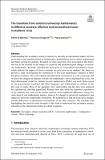The transition from school to university mathematics in different contexts: affective and sociocultural issues in students’ crisis

Type de référence
Date
2022Langue de la référence
AnglaisEntité(s) de recherche
Résumé
Understanding the secondary–tertiary transition is not only an educational matter, but also an inclusion and equality matter as mathematics qualifications lead to better employment and better earning for students. Research on what causes the crisis associated to this transition has so far focused on the impact of cognitive and epistemological changes in university mathematics. Recently, attention has been given to sociocultural and affective issues, which indicate the impact of diverse contexts on such event in the students’ life. Here we present a study investigating the experiences of first-year mathematics students in three European countries. The study adopted the framework of transition as a rite of passage and to detect the changes in attitudes towards the mathematics which originated the crisis, the three-dimensional model for attitude towards mathematics (TMA) was used. Data consist in one questionnaire translated into three languages and administered to students in the first year of study. Most of the questions were open-ended, and the data were analysed first qualitatively and then quantitised. Results show that while the transition experiences of the students may seem on the surface uniform, some significant differences emerge for motivation to join mathematics degrees, motives for changes in perceived competence, and impact of university mathematics formalism. We hypothesise a link between these changes and the differences in educational environments in the three countries. We conclude with highlighting the need for more research of this kind to understand the secondary–tertiary transition in the educational context in which it happens.Titre du périodique
Educational Studies in MathematicsMaison d’édition
SpringerPays d'édition
Allemagnep-ISSN
0013-1954e-ISSN
1573-0816Evaluation par les pairs (peer reviewing)
ouiPortée nationale / internationale
internationaleVolume / tome
113Pagination
1-28URL permanente ORFEE
http://hdl.handle.net/20.500.12162/6120La publication existe uniquement sous forme électronique
ouiDocument(s) associé(s) à la référence
Texte intégral :
Fichier
Accès
Commentaire
Version
Taille
- Tout ORFEE
- Détail référence



